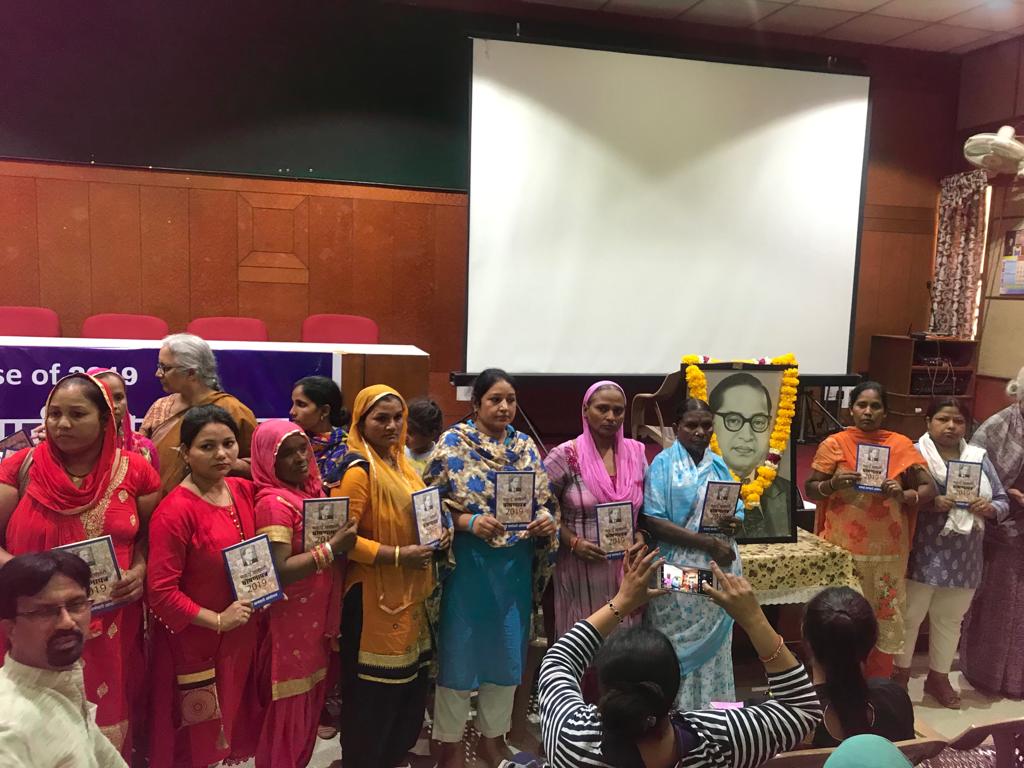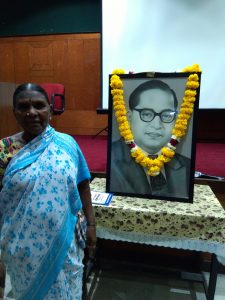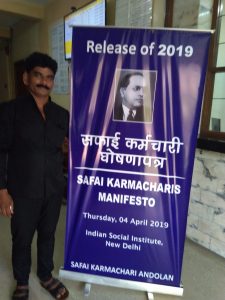
Manual scavengers want govt to clean up the mess this polls

Soon after the election dates were announced last month, Prime Minister Narendra Modi put out a series of tweets welcoming the ‘festival of democracy’, urging everyone to participate. At Delhi’s Indian Social Institute on April 4, men and women entering the main hall looked like a voters’ line outside a polling booth. Except it was not. They were here to release the first election manifesto by manual scavengers and demand an apology from the Prime Minister for the historical injustices against the community.
“The Prime Minister has remained silent even after so many sewer deaths. We demand a response, an apology. Washing the feet of safai karamcharis is not enough, they have to wash away the dirt off their minds,” says Raju Shendre, convenor, Safai Karmachari Andolan, Chhattisgarh.
Safai Karmachari Andolan, a movement for complete elimination of manual scavenging, in its manifesto, lists demands made by the manual scavengers to break the shackles of caste, patriarchy and prejudice of the Indian political class ruling them.
Bezwada Wilson, national convener of Safai Karamchari Andolan, says every member of the community should ask politicians to first commit to these demands before asking for their vote. “There is a death every third day but politicians don’t care. We are not requesting them but ordering them to take action,” Wilson says, urging the workers not to vote on religious and polarising issues.

Sitting among a motley crowd of men, women and children inside the hall was C Narayanamma, the first woman from Andhra Pradesh to leave her profession of manual scavenging in Ananthpur town of the state. It was that one act of Narayanamma which started a movement of sorts, inspiring other women like her to leave their undignified lives. The dry toilet, which she used to clean, was later broken down and turned into a school. Today, a board member of Safai Karmachari Andolan, Narayanamma came all the way to the national capital to release the manifesto. “This manifesto is our way of telling the political class what they actually need to do to improve our lives and not just hide behind meaningless official policies and laws that were never implemented on the ground,” she says.
Numbers don’t lie
Manual scavenging was first outlawed in 1993, and the ban was restated in 2013 with rehabilitation measures laid out for workers. But the practice still continues. According to the manifesto released by the Safai Karamchari Andolan, more than 382 safai karamcharis were killed in septic tanks and manholes in the past four years. As many as 31 deaths were reported in the last three months alone.
Moreover, there is no record of exact number of people engaged in the caste-based profession. The government recognised 12,742 manual scavengers in 13 states following the Prohibition of Employment of Manual Scavengers and Their Rehabilitation Act, 2013. However, it is disputed that this number is a gross under-representation. It’s not just the activists and dalit leaders but even the Supreme Court has said so, especially when different sets of government data paint a different picture. For instance, according to the Economic Caste Census 2011, there are 1,82,505 families in rural India engaged in manual scavenging.
“These numbers don’t really matter. We don’t understand the government’s number game. What matters to us is what is being done to improve our lives. We have lost enough lives to manual scavenging. These are not deaths. These are murders,” says Shendre.

According to Shendre, who grew up seeing both his parents carry human excreta from toilets and cleaning sewer lines, all that governments do is talk. “They say there are schemes to provide alternate sources of livelihood for workers involved in manual scavenging. But where are those sources? Those who are no longer into manual scavenging are sitting jobless,” he says.
Reshma from Haryana concurs. “It’s true the government says there are self-employment schemes for rehabilitation but the paper work is too tedious for illiterate people. Moreover, it is impossible to fight the red-tape. The standard answer you get from the babus is — abhi dekhte hai (We are looking into it).”
Self-employment
The self-employment scheme Reshma was talking about is the National Scheme for Liberation and Rehabilitation of Scavengers (NSLRS) that was launched in 1992. Financial assistance under NSLRS is meant to create alternative sources of livelihood for persons involved in manual scavenging.
Another big hurdle, Reshma says, is the fear of not being able to repay those loans. “You can say I can open a shop or start some business but what do I do when people don’t come to my shop because of my caste?”
Shendre too has been a victim of the same attitude. “I refused to carry human excreta. So when I had to drop out of school after Class 6, I rebelled at home and decided to earn my livelihood by selling vegetables. But there were people who would think twice before buying from my cart. It took a long time for them to un-see my caste and just see the colours of the vegetables on the cart.”
But not everyone has Shendre’s patience, most give up the fight amid the existing prejudice and penury.
A middle-aged woman sitting next to Reshma quips, “How would you feel when you go to work at their place and you find them offering you tea in a separate cup. They don’t even touch it themselves, they often ask us to pick up the cup, usually kept in a damp corner. We have to wash it before coming and keep it back for the next safai karamchari who goes to work at their place. Who would want to go to such places?”
According to the Safai Karamchari Andolan’s manifesto, it is employment in the government sector that would guarantee socio-economic empowerment. The manifesto calls for “government employment to at least one woman member in the household of every manual scavenger”. “When a woman has a permanent public sector employment, she will not only empower herself but her entire family and community,” it says.
“We don’t just want money. It is government jobs that will bring real change to the community,” says Narayanamma, adding that three of her 10 grandchildren are jobless despite having engineering degrees.
Some of the other demands include allocating grants instead of current loan schemes, regular pension of ₹6,000 per month for workers over 55 years, and increase in the compensation given in case of death from ₹10 lakh to ₹1 crore, a separate ministry for their rehabilitation under PMO, housing and education benefits, 1% allocation of Budget for the sector, and inclusion of deaths and atrocities to be registered as criminal cases under the National Crime Records Bureau data.
The workers have demanded a dedicated session of Parliament on manual scavenging deaths and rehabilitation efforts. A major demand for rehabilitation of manual scavengers in the “non-sanitation sector” proposes the introduction of a unique ‘right to life card’ or RL-21 named after Article 21 of the Constitution.
“In today’s age of smart cards, this card should enable free access to education, healthcare and employment and no other document should be asked from manual scavengers,” says Wilson. The crowd listening to him concurs and responds with loud cheers of ‘Jai Bhim’.

